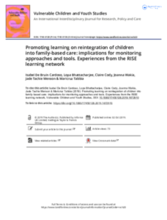Displaying 401 - 410 of 991
The current study examines social networks and utilization of social support among young people ages 18 to 25 from one southeastern state in the US who had aged out of care or were in extended foster care.
This article considers the application of Communities of Practice theory to understand transition into, through and out of care, arguing that a sense of belonging and identity emerges from participation in supportive communities. The authors consider the influence of community on looked after children and care leavers’ sense of identity, engagement and well-being in transition.
This article from the Vulnerable Children and Youth Studies journal presents lessons learned from a RISE Learning Network learning project focused on monitoring (M&E Learning Project) and aimed to generate understanding of approaches and tools that could effectively monitor children and families’ reintegration outcomes. The mid- and end-term reviews of the M&E Learning Project have captured lessons learned on how practitioners can approach monitoring of reintegration to mainstream it into their programme cycle.
On Sept. 19, the Casey Foundation hosted a webinar sharing data and lessons from the first phase of Learn and Earn to Achieve Potential (LEAP)™, an effort to boost employment and educational opportunities for young people ages 15 to 25 who’ve experienced homelessness or been involved with public systems.
Using a case study approach, this article will review a pre-college summer program designed specifically for youth transitioning from foster care, the National Social Work Enrichment Program (NSEP).
In the present study, focused on Latin American migrant women, transnational ties are considered a protective factor of family functioning, conditioned by premigratory variables. The working hypothesis is that increased frequency of reunited mothers' communication with and remittances to their children during the period of separation prior to the reunion will be linked to better communication, cohesion, flexibility, satisfaction, and family resources, according to the reunited mothers' perception.
In this two-part video series, Nou Dalin, part of the social work team with Cambodia Children's Trust (CCT), discusses her experience of working in partnership with the Department of Social Affairs, Veterans and Youth Rehabilitation (DoSVY) to implement the Ministry of Social Affairs, Veterans and Youth Rehabilitation (MoSVY) Action Plan on Improving Childcare in Battambang Province in Cambodia.
Comprised of 12 videos and accompanying discussion guides, this video series features the learning from practitioners working across a range of care-related programs and practices in Cambodia.
In this two-part video series, Nou Dalin, part of the social work team with Cambodia Children's Trust (CCT), discusses her experience of working in partnership with the Department of Social Affairs, Veterans and Youth Rehabilitation (DoSVY) to implement the Ministry of Social Affairs, Veterans and Youth Rehabilitation (MoSVY) Action Plan on Improving Childcare in Battambang Province in Cambodia.
This video shares insights from the Angkor Hospital for Children social work unit’s key learning around what leads to abandonment, how to work with families to identify and solve underlying issues, how to engage and communicate with families and how to identify risk indicators for abandonment.

